#include <BinaryEncoding.hh>

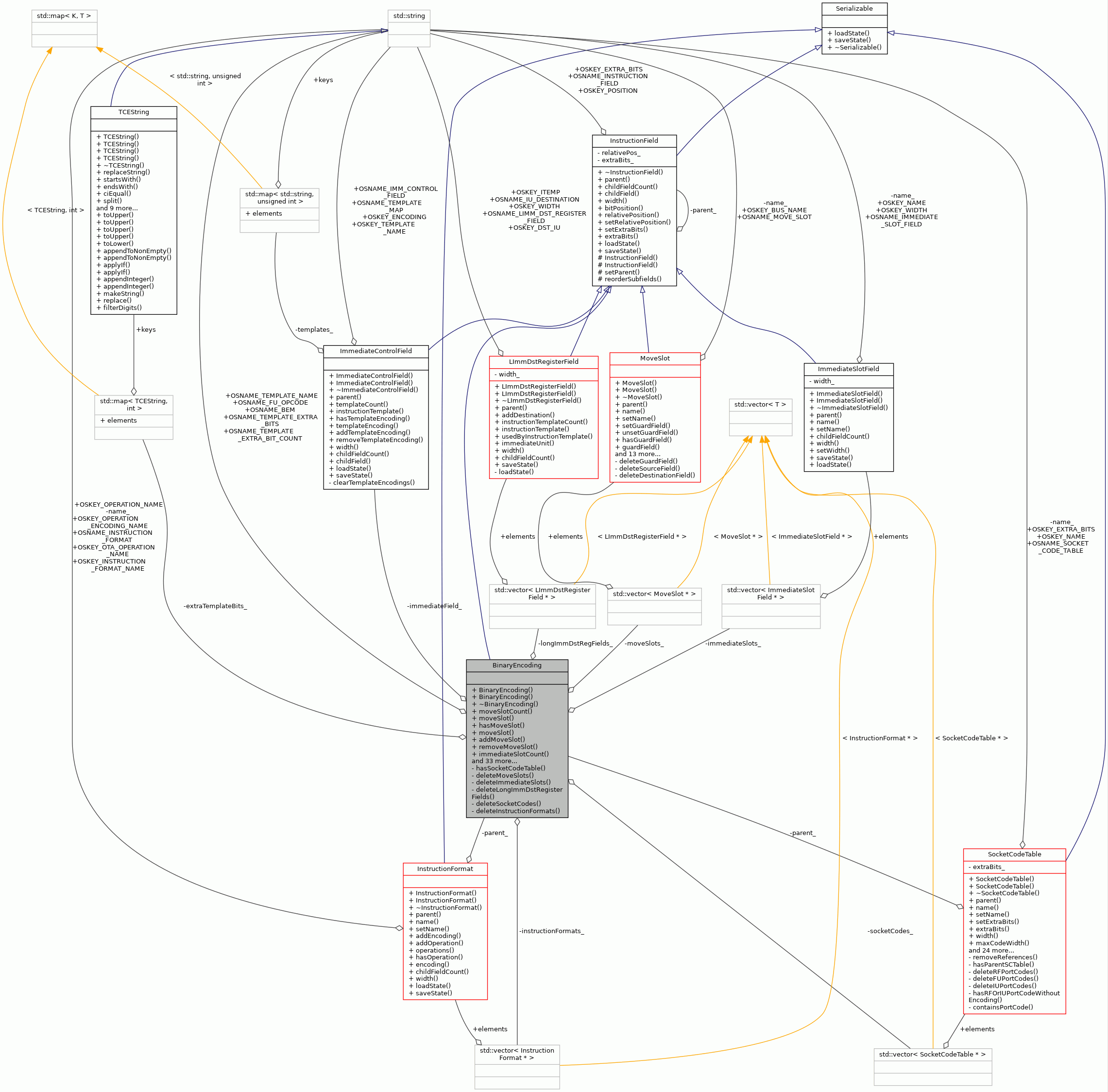
Public Types | |
| enum | Position { LEFT , RIGHT } |
Static Public Attributes | |
| static const std::string | OSNAME_BEM = "bem" |
| ObjectState name for binary encoding. | |
| static const std::string | OSNAME_FU_OPCODE |
| static const std::string | OSNAME_TEMPLATE_EXTRA_BITS |
| static const std::string | OSNAME_TEMPLATE_EXTRA_BIT_COUNT |
| static const std::string | OSNAME_TEMPLATE_NAME = "template" |
 Static Public Attributes inherited from InstructionField Static Public Attributes inherited from InstructionField | |
| static const std::string | OSNAME_INSTRUCTION_FIELD = "instr_field" |
| ObjectState name for instruction field. | |
| static const std::string | OSKEY_EXTRA_BITS = "extra_bits" |
| ObjectState attribute key for the number of extra bits. | |
| static const std::string | OSKEY_POSITION = "position" |
| ObjectState attribute key for the relative position of the field. | |
Private Types | |
| typedef std::vector< MoveSlot * > | MoveSlotContainer |
| Container type for MoveSlots. | |
| typedef std::vector< ImmediateSlotField * > | ImmediateSlotContainer |
| Container type for ImmediateSlotFields. | |
| typedef std::vector< SocketCodeTable * > | SocketCodeTableContainer |
| Container type for SocketCodeTables. | |
| typedef std::vector< LImmDstRegisterField * > | LImmDstRegisterFieldContainer |
| Container type for LImmDstRegisterFields. | |
| typedef std::vector< InstructionFormat * > | InstructionFormatContainer |
| Container type for InstructionFormats. | |
| typedef std::map< TCEString, int > | TemplateExtraBitCountMap |
| Template extra bit count container. | |
Private Member Functions | |
| bool | hasSocketCodeTable (const std::string &name) const |
| void | deleteMoveSlots () |
| void | deleteImmediateSlots () |
| void | deleteLongImmDstRegisterFields () |
| void | deleteSocketCodes () |
| void | deleteInstructionFormats () |
Private Attributes | |
| InstructionFormatContainer | instructionFormats_ |
| A container for instruction formats. | |
| MoveSlotContainer | moveSlots_ |
| A container for move slots. | |
| ImmediateSlotContainer | immediateSlots_ |
| A container for immediate slots. | |
| SocketCodeTableContainer | socketCodes_ |
| A container for socket code tables. | |
| ImmediateControlField * | immediateField_ |
| The immediate control field. | |
| LImmDstRegisterFieldContainer | longImmDstRegFields_ |
| A container for long immediate register fields. | |
| TemplateExtraBitCountMap | extraTemplateBits_ |
| Extra (padding) bits per instruction template. | |
Additional Inherited Members | |
 Protected Member Functions inherited from InstructionField Protected Member Functions inherited from InstructionField | |
| InstructionField (InstructionField *parent) | |
| InstructionField (const ObjectState *state, InstructionField *parent) | |
| void | setParent (InstructionField *parent) |
 Static Protected Member Functions inherited from InstructionField Static Protected Member Functions inherited from InstructionField | |
| static void | reorderSubfields (ObjectState *state) |
Detailed Description
BinaryEncoding is the root class in the object model of the binary encoding map.
An instance of this class is sufficient to access all the information pertaining a binary encoding map, so an object can be passed to clients whenever a full description of the encoding map is required. BinaryEncoding is mostly a specialized container of objects of other classes.
Definition at line 61 of file BinaryEncoding.hh.
Member Typedef Documentation
◆ ImmediateSlotContainer
|
private |
Container type for ImmediateSlotFields.
Definition at line 137 of file BinaryEncoding.hh.
◆ InstructionFormatContainer
|
private |
Container type for InstructionFormats.
Definition at line 143 of file BinaryEncoding.hh.
◆ LImmDstRegisterFieldContainer
|
private |
Container type for LImmDstRegisterFields.
Definition at line 141 of file BinaryEncoding.hh.
◆ MoveSlotContainer
|
private |
Container type for MoveSlots.
Definition at line 135 of file BinaryEncoding.hh.
◆ SocketCodeTableContainer
|
private |
Container type for SocketCodeTables.
Definition at line 139 of file BinaryEncoding.hh.
◆ TemplateExtraBitCountMap
|
private |
Template extra bit count container.
Definition at line 145 of file BinaryEncoding.hh.
Member Enumeration Documentation
◆ Position
Constructor & Destructor Documentation
◆ BinaryEncoding() [1/2]
| BinaryEncoding::BinaryEncoding | ( | ) |
The constructor.
Creates an empty BEM.
Definition at line 65 of file BinaryEncoding.cc.
◆ BinaryEncoding() [2/2]
| BinaryEncoding::BinaryEncoding | ( | const ObjectState * | state | ) |
The constructor.
Loads the state of the object from the given ObjectState tree.
- Exceptions
-
ObjectStateLoadingException If an error occurs while loading the state.
Definition at line 78 of file BinaryEncoding.cc.
References loadState().
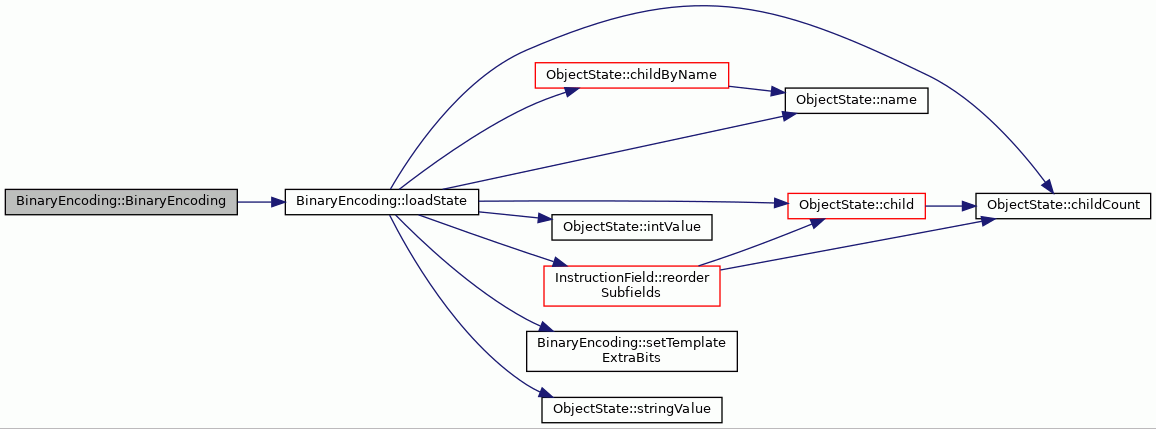
◆ ~BinaryEncoding()
|
virtual |
The destructor.
Definition at line 86 of file BinaryEncoding.cc.
References deleteImmediateSlots(), deleteInstructionFormats(), deleteLongImmDstRegisterFields(), deleteMoveSlots(), deleteSocketCodes(), hasImmediateControlField(), and immediateField_.
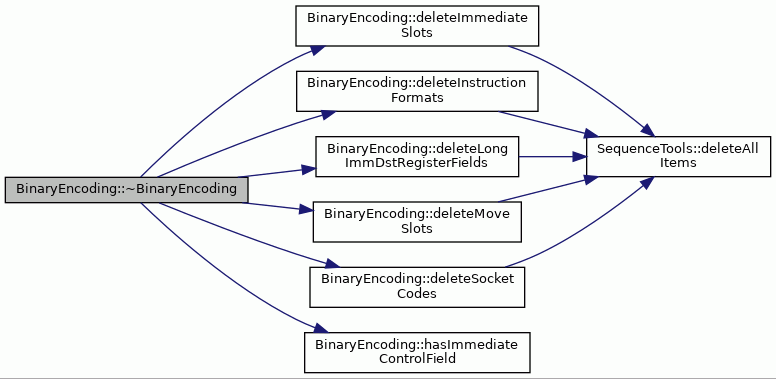
Member Function Documentation
◆ addImmediateSlot()
| void BinaryEncoding::addImmediateSlot | ( | ImmediateSlotField & | slot | ) |
Adds the given immediate slot to the encoding map.
This method is to be called from the constructor of ImmediateSlotField.
- Parameters
-
slot The immediate slot to be added.
- Exceptions
-
ObjectAlreadyExists If the encoding map contains an immediate slot with the same name already.
Definition at line 300 of file BinaryEncoding.cc.
References assert, hasImmediateSlot(), immediateSlots_, ImmediateSlotField::name(), and ImmediateSlotField::parent().
Referenced by ImmediateSlotField::ImmediateSlotField(), and ImmediateSlotField::ImmediateSlotField().

◆ addInstructionFormat()
| void BinaryEncoding::addInstructionFormat | ( | InstructionFormat & | format | ) |
Adds the given instruction format to the encoding map.
- Parameters
-
format The instruction format to be added.
- Exceptions
-
ObjectAlreadyExists If the encoding map already contains a a socket code table with the same name as the given table.
Definition at line 557 of file BinaryEncoding.cc.
References assert, hasInstructionFormat(), instructionFormats_, InstructionFormat::name(), and InstructionFormat::parent().
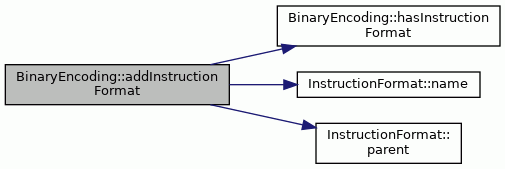
◆ addLongImmDstRegisterField()
| void BinaryEncoding::addLongImmDstRegisterField | ( | LImmDstRegisterField & | field | ) |
Adds the given long immediate destination register field to the instruction format.
This method is to be called from the constructor of LImmDstRegisterField only!
- Parameters
-
field The field to add.
Definition at line 459 of file BinaryEncoding.cc.
References assert, longImmDstRegFields_, and LImmDstRegisterField::parent().
Referenced by LImmDstRegisterField::LImmDstRegisterField(), and LImmDstRegisterField::LImmDstRegisterField().

◆ addMoveSlot()
| void BinaryEncoding::addMoveSlot | ( | MoveSlot & | slot | ) |
Adds the given move slot to the encoding map.
This method is to be called from the constructor of MoveSlot.
- Parameters
-
slot The move slot to be added.
- Exceptions
-
ObjectAlreadyExists If the encoding map contains a slot with the same name already.
Definition at line 183 of file BinaryEncoding.cc.
References assert, hasMoveSlot(), moveSlots_, MoveSlot::name(), and MoveSlot::parent().
Referenced by MoveSlot::MoveSlot(), and MoveSlot::MoveSlot().

◆ addSocketCodeTable()
| void BinaryEncoding::addSocketCodeTable | ( | SocketCodeTable & | table | ) |
Adds the given socket code table to the encoding map.
This method is to be called from the constructor of SocketCodeTable.
- Parameters
-
table The socket code table to be added.
- Exceptions
-
ObjectAlreadyExists If the encoding map already contains a socket code table with the same name as the given table.
Definition at line 644 of file BinaryEncoding.cc.
References assert, hasSocketCodeTable(), SocketCodeTable::name(), SocketCodeTable::parent(), and socketCodes_.
Referenced by SocketCodeTable::SocketCodeTable(), and SocketCodeTable::SocketCodeTable().

◆ childField()
|
virtual |
Returns the child instruction field at the given relative position.
Returns a NullInstructionField instance if there is no child field at the given position. This is, however, not possible if the object model is in consistent state.
- Parameters
-
position The relative position.
- Returns
- The instruction field at the given relative position.
- Exceptions
-
OutOfRange If the given position is negative or not smaller than the number of child fields.
Reimplemented from InstructionField.
Definition at line 723 of file BinaryEncoding.cc.
References childFieldCount(), hasImmediateControlField(), immediateControlField(), immediateSlot(), immediateSlotCount(), NullInstructionField::instance(), longImmDstRegisterField(), longImmDstRegisterFieldCount(), moveSlot(), moveSlotCount(), and InstructionField::relativePosition().
Referenced by CodeCompressorPlugin::bemInstructionBits(), and printInstructionLayout().
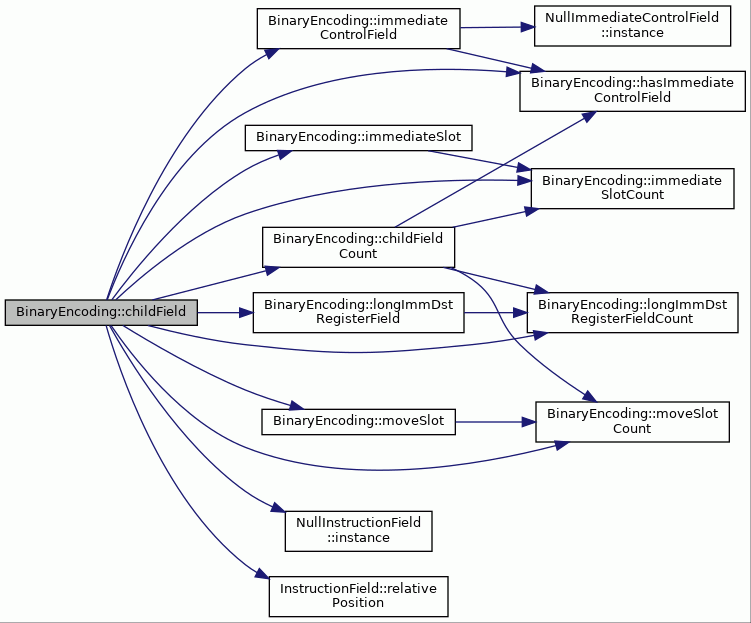
◆ childFieldCount()
|
virtual |
Returns the number of immediate child fields (move slots + immediate slots + immediate control field).
- Returns
- The number of child fields.
Implements InstructionField.
Definition at line 700 of file BinaryEncoding.cc.
References hasImmediateControlField(), immediateSlotCount(), longImmDstRegisterFieldCount(), and moveSlotCount().
Referenced by childField(), and printInstructionLayout().
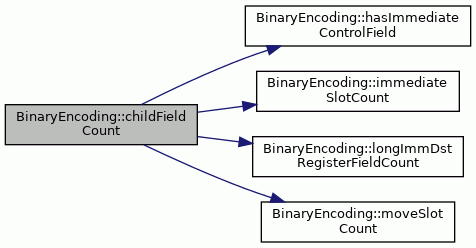
◆ deleteImmediateSlots()
|
private |
Deletes all the immediate slots contained by the encoding map.
Definition at line 980 of file BinaryEncoding.cc.
References SequenceTools::deleteAllItems(), and immediateSlots_.
Referenced by ~BinaryEncoding().

◆ deleteInstructionFormats()
|
private |
Deletes all the instruction formats contained by the encoding map.
Definition at line 1007 of file BinaryEncoding.cc.
References SequenceTools::deleteAllItems(), and instructionFormats_.
Referenced by ~BinaryEncoding().

◆ deleteLongImmDstRegisterFields()
|
private |
Deletes all the long immediate destination register fields contained by the encoding map.
Definition at line 990 of file BinaryEncoding.cc.
References SequenceTools::deleteAllItems(), and longImmDstRegFields_.
Referenced by ~BinaryEncoding().

◆ deleteMoveSlots()
|
private |
Deletes all the move slots contained by the encoding map.
Definition at line 971 of file BinaryEncoding.cc.
References SequenceTools::deleteAllItems(), and moveSlots_.
Referenced by ~BinaryEncoding().

◆ deleteSocketCodes()
|
private |
Deletes all the socket code tables contained by the encoding map.
Definition at line 999 of file BinaryEncoding.cc.
References SequenceTools::deleteAllItems(), and socketCodes_.
Referenced by ~BinaryEncoding().

◆ hasImmediateControlField()
| bool BinaryEncoding::hasImmediateControlField | ( | ) | const |
Tells whether the instruction word has an immediate control field.
- Returns
- True if the instruction word has an immediate control field, otherwise false.
Definition at line 334 of file BinaryEncoding.cc.
References immediateField_.
Referenced by BEMValidator::checkImmediateControlField(), childField(), childFieldCount(), CodeCompressorPlugin::firstMoveSlotIndex(), immediateControlField(), DefaultDecoderGenerator::instructionTemplateCondition(), printImmediateControlField(), saveState(), setImmediateControlField(), unsetImmediateControlField(), width(), DefaultDecoderGenerator::writeInstructionDismembering(), DefaultDecoderGenerator::writeLongImmediateTagSignal(), DefaultDecoderGenerator::writeLongImmediateWriteProcess(), and ~BinaryEncoding().
◆ hasImmediateSlot()
| bool BinaryEncoding::hasImmediateSlot | ( | const std::string & | name | ) | const |
Tells whether the encoding map contains an immediate slot with the given name.
- Parameters
-
name The name of the immediate slot.
- Returns
- True if there is an immediate slot with the given name, otherwise false.
Definition at line 252 of file BinaryEncoding.cc.
References immediateSlots_, and ImmediateSlotField::name().
Referenced by addImmediateSlot(), and BEMValidator::checkImmediateSlot().

◆ hasInstructionFormat()
| bool BinaryEncoding::hasInstructionFormat | ( | const std::string & | name | ) | const |
Tells whether the binary encoding has an instruction format with the given name.
- Parameters
-
name The name.
- Returns
- True if the ecoding map contains an instruction format with the given name, otherwise false.
Definition at line 502 of file BinaryEncoding.cc.
References instructionFormats_.
Referenced by addInstructionFormat().
◆ hasMoveSlot()
| bool BinaryEncoding::hasMoveSlot | ( | const std::string & | name | ) | const |
Tells whether the encoding map contains a move slot with the given (bus) name.
- Parameters
-
name The bus name.
- Returns
- True if there is a move slot with the given name, otherwise false.
Definition at line 138 of file BinaryEncoding.cc.
References moveSlots_, and MoveSlot::name().
Referenced by addMoveSlot(), BEMValidator::checkMoveSlot(), DefaultDecoderGenerator::writeSquashSignalGenerationProcess(), and DefaultDecoderGenerator::writeSquashSignals().

◆ hasSocketCodeTable()
|
private |
Tells whether the encoding map contains a socket code table with the given name.
- Parameters
-
name The name.
- Returns
- True if the encoding map contains a socket code table with the given name, otherwise false.
Definition at line 954 of file BinaryEncoding.cc.
References SocketCodeTable::name(), and socketCodes_.
Referenced by addSocketCodeTable().

◆ immediateControlField()
| ImmediateControlField & BinaryEncoding::immediateControlField | ( | ) | const |
Returns the immediate control field of the instruction word, if one exists.
Returns a NullImmediateControlField instance otherwise (a single-template instruction).
- Returns
- The immediate control field.
Definition at line 348 of file BinaryEncoding.cc.
References hasImmediateControlField(), immediateField_, and NullImmediateControlField::instance().
Referenced by BEMValidator::checkImmediateControlField(), childField(), CodeCompressorPlugin::firstMoveSlotIndex(), DefaultDecoderGenerator::instructionTemplateCondition(), printImmediateControlField(), saveState(), unsetImmediateControlField(), width(), DefaultDecoderGenerator::writeInstructionDismembering(), DefaultDecoderGenerator::writeLongImmediateTagSignal(), and DefaultDecoderGenerator::writeSquashSignalGenerationProcess().

◆ immediateSlot() [1/2]
| ImmediateSlotField & BinaryEncoding::immediateSlot | ( | const std::string & | name | ) | const |
Returns the immediate slot of the given name.
- Parameters
-
name The name of the immediate slot.
- Returns
- The immediate slot.
- Exceptions
-
InstanceNotFound If the encoding map does not contain an immediate slot with the given name.
Definition at line 276 of file BinaryEncoding.cc.
References immediateSlots_, and ImmediateSlotField::name().

◆ immediateSlot() [2/2]
| ImmediateSlotField & BinaryEncoding::immediateSlot | ( | int | index | ) | const |
Returns the immediate slot at given index.
The index does not have to reflect the actual order within the TTA instruction word.
- Parameters
-
index The index.
- Returns
- The immediate slot at given index.
- Exceptions
-
OutOfRange If the index is negative or is not smaller than the number of immediate slots in the TTA instruction word.
Definition at line 234 of file BinaryEncoding.cc.
References immediateSlotCount(), and immediateSlots_.
Referenced by BEMValidator::checkImmediateSlot(), childField(), saveState(), width(), DefaultDecoderGenerator::writeImmediateSlotSignals(), DefaultDecoderGenerator::writeInstructionDismembering(), and DefaultDecoderGenerator::writeInstructionTemplateProcedures().

◆ immediateSlotCount()
| int BinaryEncoding::immediateSlotCount | ( | ) | const |
Returns the number of immediate slots in the instruction.
- Returns
- The number of immediate slots.
Definition at line 216 of file BinaryEncoding.cc.
References immediateSlots_.
Referenced by childField(), childFieldCount(), immediateSlot(), saveState(), width(), DefaultDecoderGenerator::writeImmediateSlotSignals(), and DefaultDecoderGenerator::writeInstructionDismembering().
◆ instructionFormat() [1/2]
| InstructionFormat * BinaryEncoding::instructionFormat | ( | const std::string & | name | ) | const |
Returns the instruction format with the given name.
- Parameters
-
name The name of the format.
- Returns
- The instruction format, null if not found
Definition at line 536 of file BinaryEncoding.cc.
References instructionFormat(), instructionFormatCount(), and InstructionFormat::name().

◆ instructionFormat() [2/2]
| InstructionFormat & BinaryEncoding::instructionFormat | ( | int | index | ) | const |
Returns the instruction format with the given index.
- Parameters
-
index The index.
- Returns
- The instruction format
- Exceptions
-
OutOfRange If the given index is negative or not smaller than the number of instruction formats in the encoding map.
Definition at line 521 of file BinaryEncoding.cc.
References __func__, instructionFormatCount(), and instructionFormats_.
Referenced by RISCVTDGen::findCustomOps(), llvm::LLVMTCERISCVIntrinsicsLowering::findRFormat(), ProGe::RV32MicroCodeGenerator::initializeOperations(), and instructionFormat().

◆ instructionFormatCount()
| int BinaryEncoding::instructionFormatCount | ( | ) | const |
Returns the number of instruction formats in the in binary encoding.
- Returns
- The number of instruction formats.
Definition at line 488 of file BinaryEncoding.cc.
References instructionFormats_.
Referenced by llvm::LLVMTCERISCVIntrinsicsLowering::findRFormat(), ProGe::RV32MicroCodeGenerator::initializeOperations(), instructionFormat(), instructionFormat(), and saveState().
◆ loadState()
|
virtual |
Loads the state of the binary encoding map from the given ObjectState tree.
- Parameters
-
state The ObjectState tree.
- Exceptions
-
ObjectStateLoadingException If an error occurs while loading the state.
Reimplemented from InstructionField.
Definition at line 826 of file BinaryEncoding.cc.
References ObjectState::child(), ObjectState::childByName(), ObjectState::childCount(), ObjectState::intValue(), ObjectState::name(), OSNAME_BEM, ImmediateControlField::OSNAME_IMM_CONTROL_FIELD, ImmediateSlotField::OSNAME_IMMEDIATE_SLOT_FIELD, LImmDstRegisterField::OSNAME_LIMM_DST_REGISTER_FIELD, MoveSlot::OSNAME_MOVE_SLOT, SocketCodeTable::OSNAME_SOCKET_CODE_TABLE, OSNAME_TEMPLATE_EXTRA_BIT_COUNT, OSNAME_TEMPLATE_EXTRA_BITS, OSNAME_TEMPLATE_NAME, InstructionField::reorderSubfields(), setTemplateExtraBits(), and ObjectState::stringValue().
Referenced by BinaryEncoding().
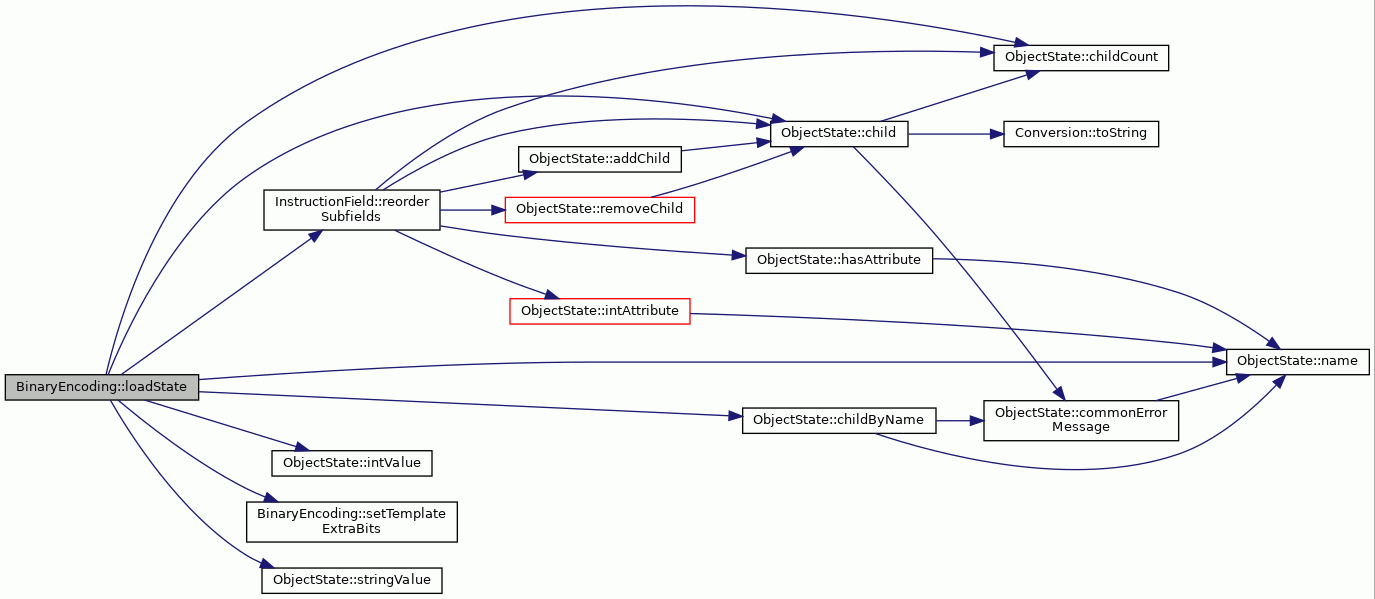
◆ longestTemplateExtraBits()
| int BinaryEncoding::longestTemplateExtraBits | ( | ) | const |
Returns the extra template bit amount in the largest template in the machine. Needed for instructionField's bitPosition-method.
- Returns
- The extra padding bits in the longest instruction template.
Definition at line 676 of file BinaryEncoding.cc.
References immediateField_, ImmediateControlField::instructionTemplate(), ImmediateControlField::templateCount(), templateExtraBits(), and width().

◆ longImmDstRegisterField() [1/2]
| LImmDstRegisterField & BinaryEncoding::longImmDstRegisterField | ( | const std::string & | iTemp, |
| const std::string & | dstUnit | ||
| ) | const |
Returns the long immediate destination register field that gives the destination register of the given immediate unit in the given instruction template.
- Parameters
-
iTemp Name of the instruction template. dstUnit Name of the immediate unit.
- Returns
- The long immediate destination register field.
- Exceptions
-
InstanceNotFound If there is no such field.
Definition at line 434 of file BinaryEncoding.cc.
References __func__, LImmDstRegisterField::immediateUnit(), longImmDstRegisterField(), longImmDstRegisterFieldCount(), and LImmDstRegisterField::usedByInstructionTemplate().

◆ longImmDstRegisterField() [2/2]
| LImmDstRegisterField & BinaryEncoding::longImmDstRegisterField | ( | int | index | ) | const |
Returns a long immediate destination register field by the given index.
- Parameters
-
index The index.
- Returns
- The field.
- Exceptions
-
OutOfRange If the index is negative or not smaller than the number of long immediate destination register fields.
Definition at line 415 of file BinaryEncoding.cc.
References __func__, longImmDstRegFields_, and longImmDstRegisterFieldCount().
Referenced by BEMValidator::checkLImmDstRegisterFields(), childField(), CodeCompressorPlugin::firstMoveSlotIndex(), longImmDstRegisterField(), printBEMInfo(), saveState(), width(), and DefaultDecoderGenerator::writeInstructionTemplateProcedures().

◆ longImmDstRegisterFieldCount()
| int BinaryEncoding::longImmDstRegisterFieldCount | ( | ) | const |
Returns the number of long immediate destination register fields in the instruction.
- Returns
- The number of fields.
Definition at line 400 of file BinaryEncoding.cc.
References longImmDstRegFields_.
Referenced by BEMValidator::checkLImmDstRegisterFields(), childField(), childFieldCount(), CodeCompressorPlugin::firstMoveSlotIndex(), longImmDstRegisterField(), longImmDstRegisterField(), printBEMInfo(), saveState(), and width().
◆ moveSlot() [1/2]
| MoveSlot & BinaryEncoding::moveSlot | ( | const std::string & | name | ) | const |
Returns the move slot that programs the bus identified by the given name.
- Parameters
-
The bus name.
- Returns
- The move slot.
- Exceptions
-
InstanceNotFound If the encoding map does not contain a move slot with the given name.
Definition at line 160 of file BinaryEncoding.cc.
References moveSlots_, and MoveSlot::name().

◆ moveSlot() [2/2]
| MoveSlot & BinaryEncoding::moveSlot | ( | int | index | ) | const |
Returns the move slot at given index.
The index does not have to reflect the actual order within the TTA instruction word.
- Parameters
-
index The index.
- Returns
- The move slot at given index.
- Exceptions
-
OutOfRange If the index is negative or is not smaller than the number of move slots of the TTA instruction word.
Definition at line 121 of file BinaryEncoding.cc.
References moveSlotCount(), and moveSlots_.
Referenced by BEMValidator::checkDestinationField(), BEMValidator::checkGuardField(), BEMValidator::checkSourceField(), childField(), DestinationField::DestinationField(), ProGe::RV32MicroCodeGenerator::findBusWidths(), BEMGenerator::generate(), CodeCompressorPlugin::moveSlotWidth(), printBEMInfo(), saveState(), SourceField::SourceField(), width(), DefaultDecoderGenerator::writeBusControlRulesOfOutputSocket(), DefaultDecoderGenerator::writeBusControlRulesOfSImmSocketOfBus(), DefaultDecoderGenerator::writeControlRulesOfFUInputPort(), DefaultDecoderGenerator::writeControlRulesOfFUOutputPort(), DefaultDecoderGenerator::writeControlRulesOfRFReadPort(), DefaultDecoderGenerator::writeControlRulesOfRFWritePort(), DefaultDecoderGenerator::writeInstructionDismembering(), DefaultDecoderGenerator::writeInstructionTemplateProcedures(), DefaultDecoderGenerator::writeMoveFieldSignals(), DefaultDecoderGenerator::writeSimmDataSignal(), DefaultDecoderGenerator::writeSquashSignalGenerationProcess(), DefaultDecoderGenerator::writeSquashSignals(), and SocketCodeTable::~SocketCodeTable().

◆ moveSlotCount()
| int BinaryEncoding::moveSlotCount | ( | ) | const |
Returns the number of move slots in the instruction.
- Returns
- The number of move slots.
Definition at line 104 of file BinaryEncoding.cc.
References moveSlots_.
Referenced by childField(), childFieldCount(), DestinationField::DestinationField(), ProGe::RV32MicroCodeGenerator::findBusWidths(), BEMGenerator::generate(), moveSlot(), CodeCompressorPlugin::moveSlotCount(), printBEMInfo(), saveState(), SourceField::SourceField(), width(), DefaultDecoderGenerator::writeInstructionDismembering(), DefaultDecoderGenerator::writeMoveFieldSignals(), and SocketCodeTable::~SocketCodeTable().
◆ removeImmediateSlot()
| void BinaryEncoding::removeImmediateSlot | ( | ImmediateSlotField & | slot | ) |
Removes the given immediate slot from the encoding map.
This method is to be called from the destructor of ImmediateSlotField.
- Parameters
-
slot The immediate slot to be removed.
Definition at line 320 of file BinaryEncoding.cc.
References assert, immediateSlots_, ImmediateSlotField::parent(), and ContainerTools::removeValueIfExists().
Referenced by ImmediateSlotField::~ImmediateSlotField().

◆ removeInstructionFormat()
| void BinaryEncoding::removeInstructionFormat | ( | InstructionFormat & | format | ) |
Removes the given instruction format from the encoding map. This method is to be called from the destructor Instruction Format.
- Parameters
-
format The instruction format to be removed.
Definition at line 577 of file BinaryEncoding.cc.
References assert, instructionFormats_, InstructionFormat::parent(), and ContainerTools::removeValueIfExists().

◆ removeLongImmDstRegisterField()
| void BinaryEncoding::removeLongImmDstRegisterField | ( | LImmDstRegisterField & | field | ) |
Removes the given long immediate destination register field from the instruction format.
This method is to be called from the destructor of LImmDstRegisterField only!
- Parameters
-
field The field to remove.
Definition at line 475 of file BinaryEncoding.cc.
References assert, longImmDstRegFields_, LImmDstRegisterField::parent(), and ContainerTools::removeValueIfExists().
Referenced by LImmDstRegisterField::~LImmDstRegisterField().

◆ removeMoveSlot()
| void BinaryEncoding::removeMoveSlot | ( | MoveSlot & | slot | ) |
Removes the given move slot from the encoding map.
This method is to be called from the destructor of MoveSlot.
- Parameters
-
slot The move slot to be removed.
Definition at line 203 of file BinaryEncoding.cc.
References assert, moveSlots_, MoveSlot::parent(), and ContainerTools::removeValueIfExists().
Referenced by MoveSlot::~MoveSlot().

◆ removeSocketCodeTable()
| void BinaryEncoding::removeSocketCodeTable | ( | SocketCodeTable & | table | ) |
Removes the given socket code table from the encoding map.
This method is to be called from the destructor of SocketCodeTable.
- Parameters
-
table The socket code table to be removed.
Definition at line 664 of file BinaryEncoding.cc.
References assert, SocketCodeTable::parent(), ContainerTools::removeValueIfExists(), and socketCodes_.
Referenced by SocketCodeTable::~SocketCodeTable().

◆ saveState()
|
virtual |
Saves the state of the binary encoding map to an ObjectState tree.
- Returns
- The newly created ObjectState tree.
Reimplemented from InstructionField.
Definition at line 877 of file BinaryEncoding.cc.
References ObjectState::addChild(), extraTemplateBits_, hasImmediateControlField(), immediateControlField(), immediateSlot(), immediateSlotCount(), instructionFormatCount(), instructionFormats_, longImmDstRegisterField(), longImmDstRegisterFieldCount(), moveSlot(), moveSlotCount(), OSNAME_BEM, OSNAME_TEMPLATE_EXTRA_BIT_COUNT, OSNAME_TEMPLATE_EXTRA_BITS, OSNAME_TEMPLATE_NAME, saveState(), ImmediateSlotField::saveState(), LImmDstRegisterField::saveState(), MoveSlot::saveState(), SocketCodeTable::saveState(), ObjectState::setValue(), socketCodeTable(), and socketCodeTableCount().
Referenced by ProGe::ProGeUI::loadBinaryEncoding(), saveState(), and BEMSerializer::writeBinaryEncoding().
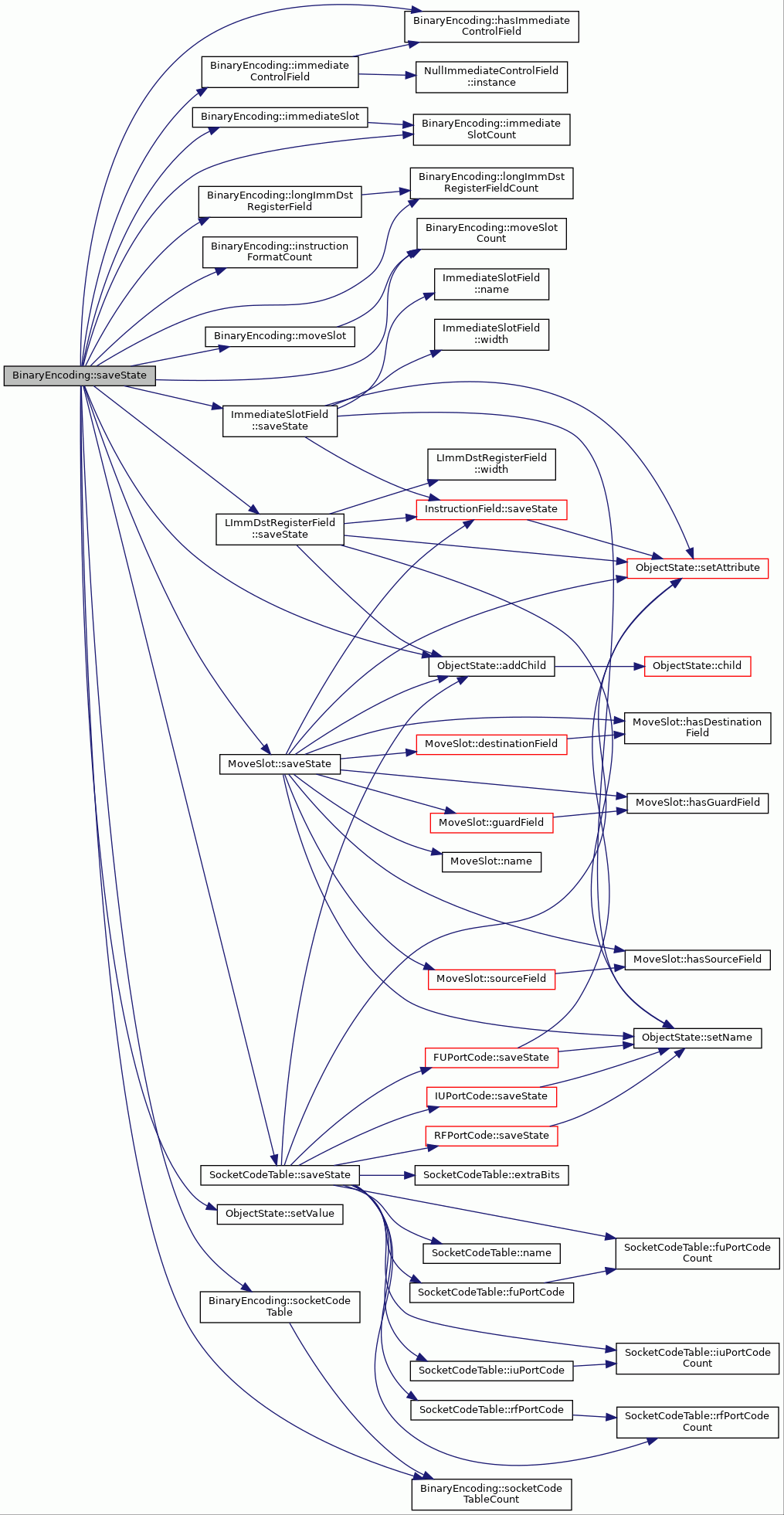
◆ setImmediateControlField()
| void BinaryEncoding::setImmediateControlField | ( | ImmediateControlField & | field | ) |
Adds the given immediate control field to the instruction word.
This method is to be called from the constructor of ImmediateControlField.
- Parameters
-
field The immediate control field to be added.
- Exceptions
-
ObjectAlreadyExists If the instruction word already has an immediate control field.
Definition at line 367 of file BinaryEncoding.cc.
References assert, hasImmediateControlField(), immediateField_, and ImmediateControlField::parent().
Referenced by ImmediateControlField::ImmediateControlField(), and ImmediateControlField::ImmediateControlField().

◆ setTemplateExtraBits()
| void BinaryEncoding::setTemplateExtraBits | ( | const TCEString & | templateName, |
| int | bitCount | ||
| ) |
Sets the extra padding bit count for an instruction template
Definition at line 1014 of file BinaryEncoding.cc.
References extraTemplateBits_.
Referenced by loadState().
◆ socketCodeTable() [1/2]
| SocketCodeTable & BinaryEncoding::socketCodeTable | ( | const std::string & | name | ) | const |
Returns the socket code table which has the given name.
Returns a NullSocketCodeTable instance if there is no such table.
- Parameters
-
name Name of the table.
- Returns
- The socket code table.
Definition at line 620 of file BinaryEncoding.cc.
References NullSocketCodeTable::instance(), SocketCodeTable::name(), socketCodeTable(), and socketCodeTableCount().

◆ socketCodeTable() [2/2]
| SocketCodeTable & BinaryEncoding::socketCodeTable | ( | int | index | ) | const |
Returns the socket code table at the given index.
- Parameters
-
index The index.
- Exceptions
-
OutOfRange If the given index is negative or not smaller than the number of socket code tables in the encoding map.
Definition at line 602 of file BinaryEncoding.cc.
References socketCodes_, and socketCodeTableCount().
Referenced by SocketCodeTable::hasParentSCTable(), saveState(), socketCodeTable(), and SocketEncoding::SocketEncoding().

◆ socketCodeTableCount()
| int BinaryEncoding::socketCodeTableCount | ( | ) | const |
Returns the number of socket code tables contained by the encoding map.
- Returns
- The number of socket code tables.
Definition at line 588 of file BinaryEncoding.cc.
References socketCodes_.
Referenced by SocketCodeTable::hasParentSCTable(), saveState(), socketCodeTable(), and socketCodeTable().
◆ templateExtraBits()
| int BinaryEncoding::templateExtraBits | ( | const TCEString & | templateName | ) | const |
Definition at line 1020 of file BinaryEncoding.cc.
References extraTemplateBits_.
Referenced by longestTemplateExtraBits(), and width().
◆ unsetImmediateControlField()
| void BinaryEncoding::unsetImmediateControlField | ( | ) |
Removes the immediate control field.
This method is to be called from the destructor of ImmediateControlField.
Definition at line 385 of file BinaryEncoding.cc.
References assert, hasImmediateControlField(), immediateControlField(), immediateField_, and InstructionField::parent().
Referenced by ImmediateControlField::~ImmediateControlField().

◆ width() [1/2]
|
virtual |
Returns the bit width of the maximum width instruction word defined by this encoding map.
- Parameters
-
If set, returns the instruction width of the given instruction template, otherwise the maximum.
- Returns
- The bit width of the instruction word.
Implements InstructionField.
Definition at line 770 of file BinaryEncoding.cc.
References immediateField_, ImmediateControlField::instructionTemplate(), ImmediateControlField::templateCount(), and width().
Referenced by longestTemplateExtraBits(), width(), and width().

◆ width() [2/2]
|
virtual |
Returns the bit width of the instruction word defined by an instruction template in this encoding map.
Definition at line 787 of file BinaryEncoding.cc.
References InstructionField::extraBits(), hasImmediateControlField(), immediateControlField(), immediateSlot(), immediateSlotCount(), longImmDstRegisterField(), longImmDstRegisterFieldCount(), moveSlot(), moveSlotCount(), templateExtraBits(), width(), ImmediateControlField::width(), ImmediateSlotField::width(), LImmDstRegisterField::width(), and MoveSlot::width().
Referenced by CodeCompressorPlugin::bemBits(), BEMValidator::checkImemMauWidth(), InstructionDictionary::createDictionary(), InstructionDictionary::generateDecompressor(), ProgramImageGenerator::generateProgramImage(), main(), printBEMInfo(), MoveSlotDictionary::printDetails(), ProGe::ProGeUI::readImemParameters(), CodeCompressorPlugin::setMachine(), MachineCanvas::updateMachine(), and DefaultICDecoderGenerator::writeGlobalDefinitions().
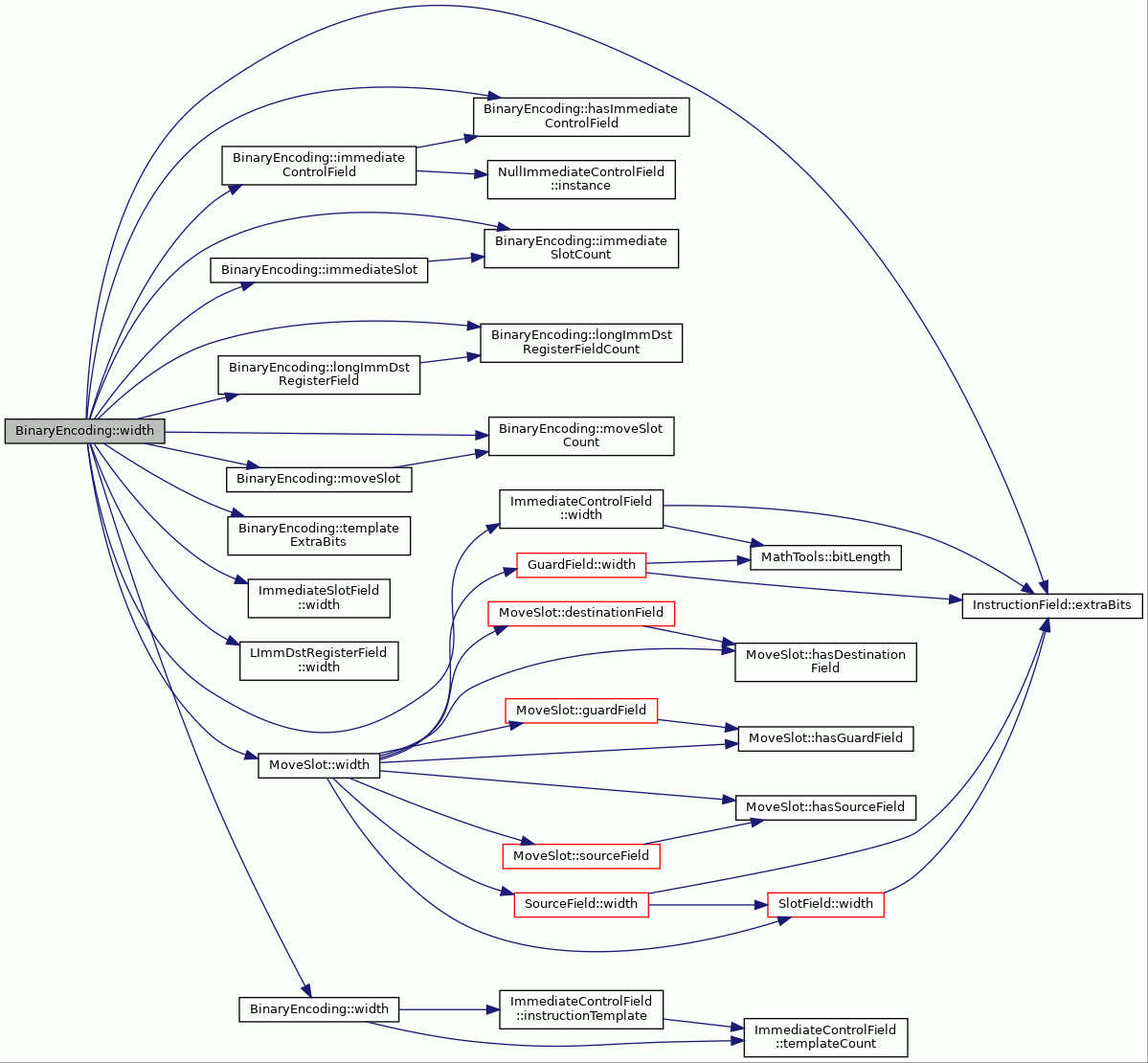
Member Data Documentation
◆ extraTemplateBits_
|
private |
Extra (padding) bits per instruction template.
Definition at line 167 of file BinaryEncoding.hh.
Referenced by saveState(), setTemplateExtraBits(), and templateExtraBits().
◆ immediateField_
|
private |
The immediate control field.
Definition at line 163 of file BinaryEncoding.hh.
Referenced by hasImmediateControlField(), immediateControlField(), longestTemplateExtraBits(), setImmediateControlField(), unsetImmediateControlField(), width(), and ~BinaryEncoding().
◆ immediateSlots_
|
private |
A container for immediate slots.
Definition at line 159 of file BinaryEncoding.hh.
Referenced by addImmediateSlot(), deleteImmediateSlots(), hasImmediateSlot(), immediateSlot(), immediateSlot(), immediateSlotCount(), and removeImmediateSlot().
◆ instructionFormats_
|
private |
A container for instruction formats.
Definition at line 155 of file BinaryEncoding.hh.
Referenced by addInstructionFormat(), deleteInstructionFormats(), hasInstructionFormat(), instructionFormat(), instructionFormatCount(), removeInstructionFormat(), and saveState().
◆ longImmDstRegFields_
|
private |
A container for long immediate register fields.
Definition at line 165 of file BinaryEncoding.hh.
Referenced by addLongImmDstRegisterField(), deleteLongImmDstRegisterFields(), longImmDstRegisterField(), longImmDstRegisterFieldCount(), and removeLongImmDstRegisterField().
◆ moveSlots_
|
private |
A container for move slots.
Definition at line 157 of file BinaryEncoding.hh.
Referenced by addMoveSlot(), deleteMoveSlots(), hasMoveSlot(), moveSlot(), moveSlot(), moveSlotCount(), and removeMoveSlot().
◆ OSNAME_BEM
|
static |
ObjectState name for binary encoding.
Definition at line 127 of file BinaryEncoding.hh.
Referenced by BEMSerializer::convertToOMFormat(), loadState(), and saveState().
◆ OSNAME_FU_OPCODE
|
static |
Definition at line 128 of file BinaryEncoding.hh.
◆ OSNAME_TEMPLATE_EXTRA_BIT_COUNT
|
static |
Definition at line 130 of file BinaryEncoding.hh.
Referenced by loadState(), and saveState().
◆ OSNAME_TEMPLATE_EXTRA_BITS
|
static |
Definition at line 129 of file BinaryEncoding.hh.
Referenced by BEMSerializer::convertToFileFormat(), BEMSerializer::convertToOMFormat(), loadState(), and saveState().
◆ OSNAME_TEMPLATE_NAME
|
static |
Definition at line 131 of file BinaryEncoding.hh.
Referenced by loadState(), and saveState().
◆ socketCodes_
|
private |
A container for socket code tables.
Definition at line 161 of file BinaryEncoding.hh.
Referenced by addSocketCodeTable(), deleteSocketCodes(), hasSocketCodeTable(), removeSocketCodeTable(), socketCodeTable(), and socketCodeTableCount().
The documentation for this class was generated from the following files: